
How To Stop Dachshund Behavior Problems
Many Dachshund owners would agree that doxies are the most loving family dog, but they can sometimes act out of spite and have choosy listening skills.
It can be very frustrating when experiencing Dachshund behavior problems. Luckily, by using some positive training techniques, many behavior challenges can be corrected…even in a Dachshund.
This page contains affiliate links and I earn a commission if you make a purchase through one of the links, at no cost to you. As an Amazon Associate, I earn from qualifying purchases.
Table Of Contents

Common Dachshund Behavior Problems
The most common Dachshund behavior problems include: Separation Anxiety, Excessive Barking, Eliminating Indoors, Digging, Destructive Chewing, and Aggression.
Let’s look at each of these issues and discover some helpful ways to resolve them.
Dachshund Separation Anxiety
We all want our dogs to feel calm and comfortable when we have to leave the house. So, it is important to understand what to do when Separation Anxiety strikes.
Separation Anxiety training is needed to help your dog learn that you will be back and they don’t need to panic when you are away.
Training Tip: If your dog has separation anxiety, most of the destruction will occur in the first 30 minutes of your departure.
Tips For Treating Separation Anxiety
Avoid Triggers
Certain noises, like getting your keys out or saying “Good-bye” can trigger a separation anxiety episode in your Dachshund.
Avoid direct interaction with your pup right before you leave.
Dogs reflect your behavior and will start to get upset if you indicate that you are leaving.
Walking
Taking your pup on a 20-minute walk each day before you leave and when you return will help calm their stress and anxiety.
Hired Help
Don’t let your Dachshund “hold it” for more than 4-5 hours at a time.
This can cause major panic and anxiety in your dachshund and it will cause them to have embarrassing accidents in your home.
If you work full time or are unable to let your doxie out during the day, hire some help or take your pup to a doggie daycare.
Search online for some local dog walkers in your area. I like to use Rover.com for dog walkers and boarding.
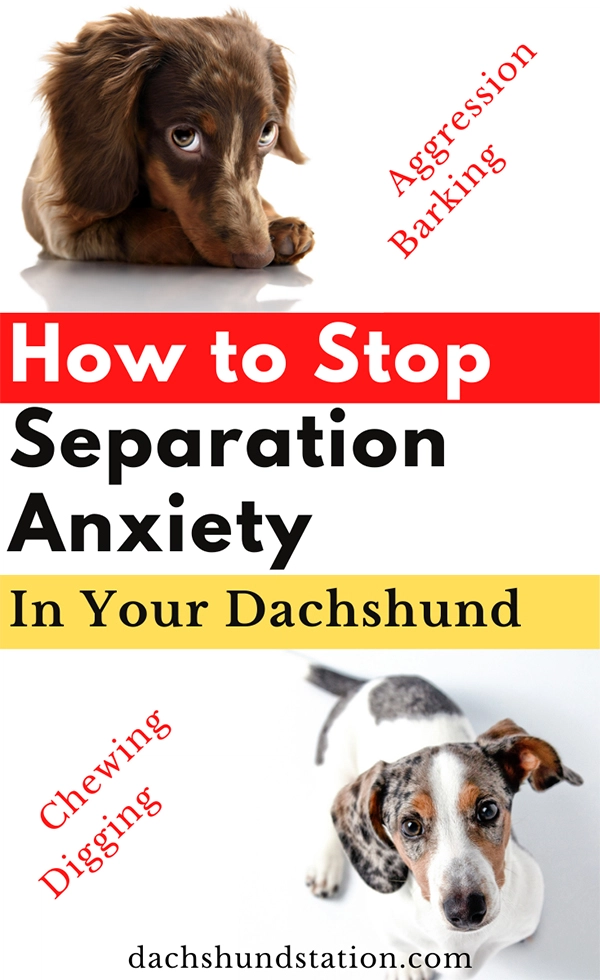
Catching Them In The Act
If you catch your Dachshund in the act of destroying something in the home through the window or remotely on a doggie camera, don’t go back inside your house!
This will reinforce the behavior. This will teach them to destroy something to get you to come back home…and you don’t want that.
Modern remote doggie camera systems (From Amazon) allow you to speak through a microphone so you can tell your dog to stop when they are up to no good.
Keeping Your Dog Occupied
Interactive dog toys and puzzles can help your dog stay mentally stimulated, so you don’t have to worry about them getting bored while you are away.
Dog IQ Puzzles: I found some great Doggie IQ Puzzles, Boredom Buster Activity Mats, and Interactive Tech Dog Toys worth checking out on my Dog Gift Post.
Treat Toys: Consider giving your dog a frozen peanut butter Kong toy treat before you leave. This is one of my favorite ways to keep my Dachshunds occupied for hours while I’m away.
Consult A Vet
For more severe cases of separation anxiety, consult your vet for some help. They may recommend some medications that can help keep your dog feel calm.
Natural Antidotes
You can use natural methods to calm dog separation anxiety too.
Calming Supplements
- Dog Calming Chews from Ready Pet Go help promote relaxation and helps reduce hyperactivity.

Sleeping Habits
Make sure your pup is getting enough sleep. Give them a comfortable dog bed and blanket to feel safe and warm at night or during nap time.
Excessive Barking
Why Do Dachshunds Bark So Much?
Dachshunds tend to bark excessively when they’re bored, excited, or simply craving some extra attention. But let’s be honest here, barking is one of the most well-known Dachshund personality traits. Along with their obsession with food, a doxie’s booming bark is practically built into the breed!
Dachshunds are naturally territorial and will bark to protect their pack (family members) and home. If your little long dog struggles with separation anxiety, this can also lead to excessive barking.
How To Stop Excessive Barking:
If your Dachshund’s needs are all met, but they still insist on barking at you…avoid responding verbally or physically.
Attention:
If you give them attention, they will continue barking to get more attention…creating a bad habit: Constant Dachshund Barking.
Give your dog positive attention and praise when they are showing good behavior (being quiet, not barking).
Exercise:
Dogs that constantly bark in the evening may be doing so out of boredom.
They need to have some playtime and more walks during the day to tire them out and help promote a good night’s sleep.
Distractions:
Dachshunds have “super senses” that help them do what they were born to do…Hunt, Track, and Guard! Their goal in life is to protect you and their home.
When your doxie barks at the door or window at something outside, tell them thank you (for keeping you safe), and lead them away from the area of distraction. This allows them to use their bark alarm a couple of times, but helps stop it from carrying on too long.
When they go potty outside, doxies are easily distracted by all of the sights, sounds, and smells of your yard. Try to find a quiet area of their yard so they can concentrate on the job at hand.
Post You May Like: Are Dachshunds Still Used For Hunting?
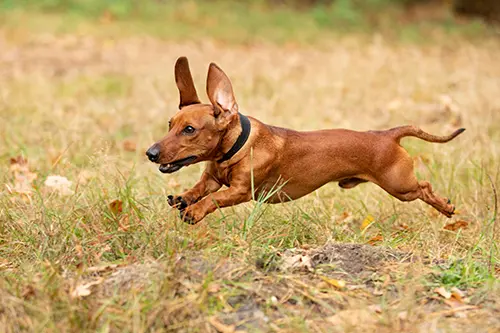
Eliminating Indoors
Dachshunds can be very temperamental. So, sometimes it can be hard to tell what the true cause of an indoor potty accident is.
Dachshund accidents in the house can be related to separation anxiety, undesirable weather outside, lack of training, Illness, or extra excitement.
It’s not always out of spite or payback.
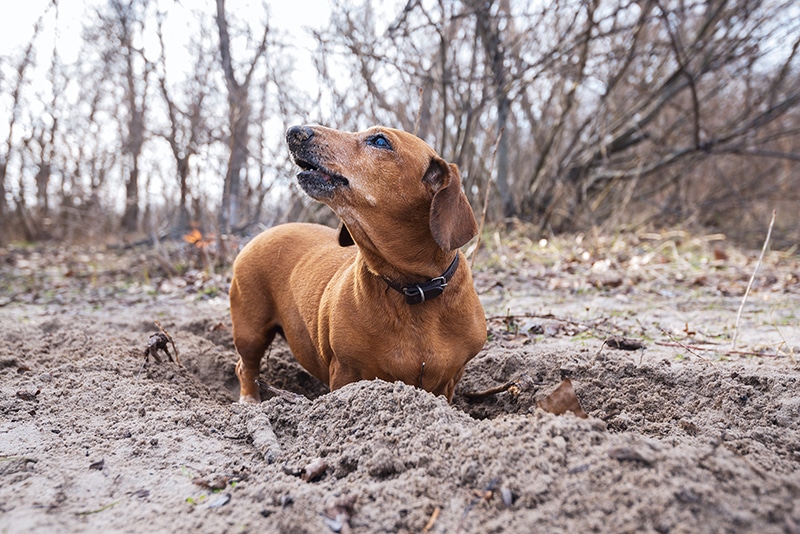
Digging
Why Do Dachshunds Dig? Dachshunds were bred to hunt badgers.
During the hunt, they had to do a lot of digging to help track down their prey.
Nowadays, doxies may dig out of boredom, hormones, temperature, or protecting their property.
Boredom:
Your dog may be bored and need something more constructive to do. Keep up their daily exercise, walking, or play routine to tire them out.
Hormones:
They may be hormonal or in-heat. Of course, the solution to this would be visiting your vet to get them spayed or neutered.
Temperature:
Your doxie might be too hot on a summer day and wants to dig and lay in the cool dirt. Be careful though, if that cool dirt is moist, it may contain nasty parasites or worms that can burrow into your dog’s skin, eww!!
Help your doxie find some cool shade or air conditioning so they are more comfortable.
Protecting Property:
A Dachshund may want to bury their favorite toy or bone.
My dachshunds love to dig and bury their toys in the couch cushions or cover their food bowls with a towel…it’s just something they do.
Chewing
As young puppies, Dachshunds use their mouths to explore their surroundings.
It is important to have lots of chew toys and bones available that your dog is allowed to chew, so he doesn’t go looking for your shoes or furniture.
Excessive Dachshund chewing can also be caused by Separation Anxiety.
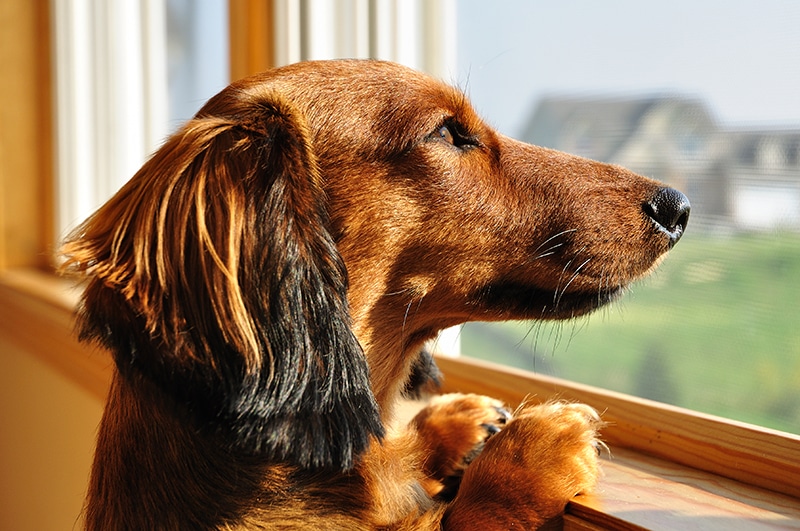
Aggression
Dachshund Aggression is the worst! So many doxie owners feel lost and upset when their loving Dachshund literally turns into a vicious brat. If your Dachshund shows their dominance towards people or dogs, they may have issues with submitting to authority.
Why Is My Dachshund Aggressive?
First, we need to look at some possible reasons for aggressive behavior in your Dachshund. Then, we will review some helpful tips to tame it.
What to Do About Dachshund Aggression
More Exercise:
Adding some more exercise to your Dachshund’s daily routine will help reduce stress and anxiety.
By walking, you are meeting your dog’s physical and mental needs. If your dog is cooped up all day, they may become more aggressive, bored, or depressed.
They need to get outside and move, just as much as you do.
One-on-One Training:
Your Dachshund loves spending time with you and earning yummy treats. So set aside some special training time each day for some one on one with your dog.

Professional Help:
If adding more exercise and revisiting command training still isn’t working for your dog, it’s time to seek professional help. Ask your vet to recommend a specialized dog behavior trainer in your area or you can do it right online.
I recommend the online dog training program from the K9 Training Institute. They have awesome reviews and offer free training sessions that you can watch right at home with your pup.
The K9 Training Institute link is an affiliate link and I will receive a commission if you click through and make a purchase, at no cost to you.
To avoid any legal ramifications, get some help to cover yourself before your dog is the cause of any injury.
Cover Yourself: If your Dachshund is known for biting, consult your vet and keep them away from children. Post signs on your property to warn visitors about any potential dangers when they enter your home or yard.
Dachshund Possession Aggression
Friends, if you notice your Dachshund getting a bit possessive over their food or toys, check out my post called “The Dark Side of the Dachshund in Your Bed.“
In this article, I explain why it’s essential to address signs of possession aggression (aka resource guarding) early on. I share insights on how this behavior can escalate to other belongings, like your furniture and explain what steps to take to handle this type of behavior.

Bonus Tip
Many of the unwanted behaviors listed above are caused by doxie hormones and can be reduced or even eliminated by getting your Dachshund dog spayed or neutered. But, it is recommended to wait until a certain age to prevent serious health risks and developmental issues.
Read More: 5 Reasons Why You Should Wait To Fix Your Dachshund
When Do Dachshunds Calm Down?
In my experience, Dachshunds start to calm down around 1 year of age. As with most small breed puppies, that 1 year mark can be a game changer for many.
I get it! Dachshund puppies are so darn cute, but that first year takes a lot of patience to survive puppy training.
Dog Breed Comparison:
When I was first married, my husband and I had a mini dachshund, a dachshund-beagle mix, and a German Shepherd. We went a little overboard on the doggie family.
My mini dachshund had less puppy energy, less chewing and less potty training issues when he turned one.
My German Shepherd’s energy didn’t really calm down until he was 4 years of age. Everything else was tamed by 9 months.
My beagle-dachshund mix adapted to his brothers potty time routines and learned everything super quick by 9 months.
Disclaimer:
This post enables people to ask for and discuss dog health-related and behavioral advice, with the aim of connecting with other dog parents who may have faced similar situations. Our position is that the readers of this post fully understand that Dachshund Station does not endorse taking any advice given or received over that of a veterinarian or a certified dog trainer. Dachshund Station (Ava Jaine) is not responsible for the consequences of anyone choosing to implement any advice they receive.
The advice provided in this post is intended for informational purposes and does not constitute medical advice regarding dogs. For an accurate diagnosis of your dog’s condition, please make an appointment with your vet.
Are you struggling with Dachshund Behavior Problems? Please let us know in the comments below.
Helpful Links:
References:
- Schweitzer, Karen. 2010. Our Best Friends The Dachshund. Pittsburg, PA: Eldorado Ink.
- Pinney, Chris. 2010, 2000. Dachshunds. Hauppauge, NY: Barron’s Educational Series, Inc.


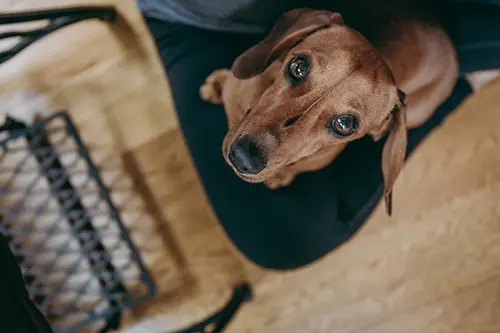


Hi. I have a standard dachshund who will be 3 in May 2021. He has recently become really aggressive towards most other dogs. It began with shaggy coated dogs but now it’s most dogs. We have an Italian greyhound too who isn’t interested in other dogs and generally runs past them. He has 2 or three walks a day, has toys to play with, gets played with a lot, is fine with children. Any advice would be appreciated.
Hi Kirsty, This seems to be a magical age for dachshunds for some reason…per the other comments below. Glad to hear that your doxie is getting plenty of exercise and playtime, this does help a lot. Is your dachshund fixed? Doxies who aren’t fixed tend to show this behavior.
It’s all about Redirection: While on your walks, when another dog approaches, turn around and go the other direction. You change your pup’s focus, taking them away from the distraction that gets them all upset. If you aren’t able to just turn around, distance yourself when another dog approaches, go across the street. Get their focus on you, if they look at you and not the distraction, give them a small treat. Positive Reward for the refocus on you and away from the other dog. This will take time and will need to be done over and over again.
I like this video about barking and lunging on walks, it’s only 10 minutes. It will help walk you through all of the steps / more of a visual help guide from It’s Me or the Dog, YouTube
Hi Ava Jaime,
We have a 5 month old miniature, we got him over a month ago. We are so in love. I have a 5 year old son & The puppy keeps growling at him. He’s very obsessed with me. As soon as I sit down he wants to go up into my lap. We have stopped all of this now. He’s started barking a lot. We are trying to stop this with treats but he gets so over excited I feel none of it is working.
Hi there, sorry to hear that your dachshund puppy is growling at your son. Definitely keep them separate unless supervised and encourage a positive environment when they are together…with treats and a fun playtime or training session.
Younger children may be a little too rough around your pup, which may make him become more “defensive” if he feels like he may get hurt or even make him feel nervous around louder sounds. I have two boys, when they get wild acting, I help my dachshund leave the room so he doesn’t get worked up.
When you sit and your puppy gets on your lap…that is a dachshund thing. They love to sit on their owner’s lap. They want to be held and cuddle on laps. Being close to you is his comfort and he needs that cuddle time to feel safe and calm down.
Ahh yes.. The Barking! Well, that is one of the doxie’s favorite things to do. Here is how to help stop the barking habit. There are some helpful tips throughout and some videos at the end as well.
10 Reasons Why Dachshunds Bark All The Time [How to Stop It]
Hello! I have a soon to be 6 month old doxie named Peter. When we brought him home, he was seriously so good and we really didn’t have a problem with potty training him. Within the last few weeks, it’s like he has turned into a different puppy. He is being very defiant and will not listen to me at all. When I try to pick him up, he lays on his back and cries so loud. I try to get him back up and he gets up and Runs full force away and cries. I’m so afraid someone is going to think that we are beating him because of the sound he makes. I don’t know where this came from and why all the sudden he has started to act like this. He gets a lot of attention throughout the day and does get a good bit of outdoor time when it’s nice out… help!
Hi Brittany,
The crying when you try to pick him up makes me worry that he is hurting somewhere or isn’t feeling well. I would consult your vet on that one. Dachshunds have very sensitive spines / backs, so there might be an issue there.
As for the new “big-boy puppy attitude”… those male dachshund hormones might be kicking in. This is normal, unfortunately. My dachshund started showing his “jekyl and hyde” disposition transition around 10 months.
If you plan to get him fixed, try to wait until he turns one, and that will help calm the “new behavior” down. I noticed about a month or two after he was fixed that my pup was a lot better – less aggression, no more marking, etc…
Keep going with the training, potty training, etc… this attitude isn’t here to stay forever…unless you don’t get him fixed that is. Give him some more playpen or baby gated room time.
Great job on the outdoor time. Is he good on the daily walks? Also consider getting some Brain games for him (see info in the link above), this helps keep the boredom / bad attitude away.